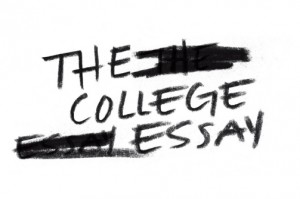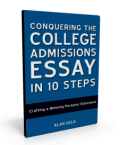 You will no doubt play some role in helping your teens to select topics for their college application essays, and it’s never easy to determine what a selection committee will find compelling. There are fine lines that students must be careful not to cross. For example, they want to write an essay that is dramatic and engaging, but they don’t want to push it into the realm of the unbelievable. And they may want to discuss events in their lives that have helped to shape them into the young adults they are, but it can be difficult not only to choose such an event, but also to determine if it’s revealing enough, or for that matter, too much.
You will no doubt play some role in helping your teens to select topics for their college application essays, and it’s never easy to determine what a selection committee will find compelling. There are fine lines that students must be careful not to cross. For example, they want to write an essay that is dramatic and engaging, but they don’t want to push it into the realm of the unbelievable. And they may want to discuss events in their lives that have helped to shape them into the young adults they are, but it can be difficult not only to choose such an event, but also to determine if it’s revealing enough, or for that matter, too much.
There’s a reason why schools require students to include essays, and it’s not just to see a sample of their writing ability. With thousands of applicants sporting similar qualifications and too few spots to accommodate them, something has to tip the scales, and it just might be the essay section. Picking the wrong one could mean getting a rejection letter. So here are just a few topics that students may want to steer clear of.
- Controversial subjects. It can be tempting to discuss attention-grabbing hot topics like gay marriage, abortion, war, drug use, and so on, but doing so can have consequences. If such topics have had a direct influence on your kids, helping to shape their lives and career goals in some way, then they might be relevant and compelling choices for an essay. But controversial topics are contentious for a reason. And while some on a review board may applaud such a choice of essay, others might not find it appropriate for students entering their institution, even if it catches their attention.
- Weaknesses. Overcoming one’s failings is noteworthy, to be sure, but that doesn’t necessarily mean it makes for a good essay topic. A “poor me” attitude will not appeal to those determining a student’s acceptance. If they have turned a weakness into a strength, or developed a strong sense of self and purpose through struggles, they could write about it. But they must find a way to make it sound positive and display some humility in the process.
- Depression and self-harm. Schools are extremely cognizant of the damage that can be done to their reputation by students that are unable to deal with the pressures and demands of college. So don’t let your kids supply them with any ammo that could make them think your students are unfit to study on their campus. Even an essay about overcoming such struggles could raise red flags.
- Short-term philanthropy. It’s great that the students in your household volunteered at a soup kitchen one Thanksgiving or went with the family to build a home for habitat for humanity, but if they’re going to do an essay about how they helped others and what it has done to change them on a personal level, they’re going to have to get a little more in-depth. A personal essay needs to be about the student, not a singular event. It needs to tell the application committee who they are and what they value. So if altruism is a cornerstone of their belief system and they’ve participated in ongoing efforts of some sort, then an essay on the topic may be appropriate. If not, it could come across as juvenile, immature, and unsympathetic.
- Generics. Whether your students are looking to attend a state college or NEC’s School of Graduate and Professional studies, they need to write an essay that conveys something unique about them. For this reason it’s best to stay away from topics that are too generic. What this means, in general, is that they need to write about something real and immediate. Any topic can be relevant if it tells readers something about the student. For example, two students could write about the death of a sibling, but one might merely relate events while the other discusses how the occurrence made him question his faith or retreat from his family and friends, only to realize how much he needed them. Admissions committees want to know something true about the character and core values of a student. So the topic is really of little consequence so long as the essay is honest, personal, and illuminating in some way.
The best tip: the college needs to know something about your student that isn’t included in the college application. Use this opportunity to shine.




